
The observation that most of the viruses that cause human disease come from other animals has led some researchers to attempt “zoonotic risk prediction” to second-guess the next virus to hit us. However, in an Essay publishing today (April 20th, 2021) in the open access journal PLOS Biology, led by Dr. Michelle Wille at the University of Sydney, Australia with co-authors Jemma Geoghegan and Edward Holmes, it is proposed that these zoonotic risk predictions are of limited value and will not tell us which virus will cause the next pandemic. Instead, we should target the human-animal interface for intensive viral surveillance.
So-called zoonotic viruses have caused epidemics and pandemics in humans for centuries. This is exactly what is occurring today with the COVID-19 pandemic: the novel coronavirus responsible for this disease — SARS-CoV-2 — emerged from an animal species, although exactly which species is uncertain.
Therefore, a key question is whether we can predict which animal or which virus group will most likely cause the next pandemic? This has led researchers to attempt “zoonotic risk prediction,” in which they attempt to determine which virus families and host groups are most likely to carry potential zoonotic and/or pandemic viruses.
Dr. Wille and her colleagues identify several key problems with zoonotic risk prediction attempts.
First, they’re based on tiny data sets. Despite decades of work, we have probably identified less than 0.001% of all viruses, even from the mammalian species from which the next pandemic virus will likely emerge.
Second, these data are also highly biased towards those viruses that most infect humans or agricultural animals, or are already known to be zoonotic. The reality is that most animals have not been surveyed for viruses, and that viruses evolve so quickly that any such surveys will soon be out of date and so of limited value.
The authors instead argue that a new approach is needed, involving the extensive sampling of animals and humans at the places where they interact — the animal-human interface. This will enable novel viruses to be detected as soon as they appear in humans and before they establish pandemics. Such enhanced surveillance may help us prevent something like COVID-19 from ever happening again.
Reference: “How accurately can we assess zoonotic risk?” by Michelle Wille, Jemma L. Geoghegan and Edward C. Holmes, 20 April 2021, PLOS Biology.
DOI: 10.1371/journal.pbio.3001135
Funding: E.C.H. is funded by an Australian Research Council Australian Laureate Fellowship (FL170100022). M.W. is supported by an Australian Research Council Discovery Early Career Researcher Award (DE200100977). The funders had no role in study design, data collection and analysis, decision to publish, or preparation of the manuscript.